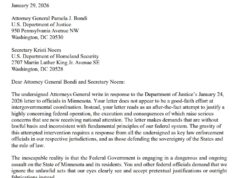 The righteous pontificators claim the housing bubble was the product of Barney, Fannie, Freddie, and policies that encouraged individual home ownership. Their perspective is that of millionaires without a nickel’s worth of contemporary financial or life experience. Ethically corrupt lenders fostered liar’s loans and the financial firewall of spurious derivatives.
The righteous pontificators claim the housing bubble was the product of Barney, Fannie, Freddie, and policies that encouraged individual home ownership. Their perspective is that of millionaires without a nickel’s worth of contemporary financial or life experience. Ethically corrupt lenders fostered liar’s loans and the financial firewall of spurious derivatives.
There are many reasons why the real estate market is in the tank and that lenders are much more cautious than during the go-go days. But there is no good reason for the whipsaw lending environment that has turned the home buying experience into an undignified series of insults. Today’s buyers are paying the bill for financial institutions that kept a blind eye to economic reality because they knew they could assign unwarranted risk away from themselves through derivatives. That combined with a very forgiving market created a highly risk tolerant environment that encouraged unwarranted loan approvals. Bob Brinker has it right when he says that never did the government tell lenders: “Go forth and make bad loans.”
Recent experience is a contrast in then and now. A decade ago I purchased a home. Closing was a painless process that I should have paid more attention to, but was so easy I didn’t give it a second thought. My wife and I were in and out of closing in less than an hour, no questions asked on either side of the table. Last fall, we decided to relocate and began a painful and disheartening journey through Virginia culminating in a tortuous and insulting process that had us very close to just walking away.
Wonder why it is taking so long to close those sales for the new homebuyer credit? Here is what I learned at this closing. Through the last decade or more, financial institutions were quite happy to cross the “t’s” and dot the “i’s” for borrowers enroute to closing. If at closing a document wasn’t available, a simple reassurance that it would be delivered, or worse, the fabrication of the supporting document by accepting a written statement that the facts were so, sufficed. A wink and a nod were extended to anyone who came to the table in what have become termed “liar’s loans.”
Now it has gone to quite the opposite extreme. Before closing, among other insults, I was required to obtain a letter from my supervisor at work that essentially stated that the company would continue to employ me under current terms and conditions. Throughout the process I was required to provide bank statements and paystubs. Just before closing I was told that I had to FAX my current bank statements and paystub. When I informed them that I only had an electronic statement because the mailed statement had not yet arrived, I was told that the electronic statement was not sufficient because it could be altered; that I would have to print it, then have it signed as verified at my financial institution, then FAX it. Then I was told that I must bring to closing a letter under my signature stating that I would not leave my employment.
These are only some of the ridiculous requirements encountered and do not give a full measure of the erratic treatment by the mortgage company. But neither these nor many of the other steps taken by the company on behalf of what was termed “the investor” really tightened the loan qualification requirements. After all, this is a “Right to Work” state where my employer can terminate me or I can quit at the drop of a hat. What are they going to do, sue to make my employer keep me on? Force me to stay at my job for the term of the loan? And so far as the bank statement…how is it that a FAX’d paper statement unsigned is more reliable than an electronic statement E-mailed?
Apparently the lenders have for so long made judgments based upon erroneous criteria, instead of using fundamentals, they are now making up new erroneous criteria. My income, work history, credit rating and history, and net worth should have provided more than sufficient information to make a solid decision. But it was as though they were making up the standards as we proceeded. As we came to the closing date that I gave as one condition for the purchase, these additional requirements popped up. Miffed, I responded that I would comply, but that my letter would not state that I would continue to work indefinitely at the same company and if there was another request for anything, I was walking. I also offered to tutor them on financial analysis. They subsequently left me alone and we closed on time.
But there is no wonder that with the success of the first time homebuyer credit lenders have not been up to the task of making the loans on time to meet the deadline. There is no doubt either that the recent fall in home sales is as much a result of the inability to secure financing as soft demand. Certainly the homes being financed for the tax credit were placed at the head of the processing list and other buyers delayed in securing financing found themselves unable to complete the transactions during the delay. Failing to meet the credit deadline, neither set of sales has occurred.
This is symptomatic of a jaundiced “free market.” Successful institutions were successful too often because their scam was more attractive than other scams and certainly more promising than financial fundamentals and reality. During the dot com boom, business students were taught that the old fundamentals of stock valuation were no longer relevant. The quick buck became the gold standard. They and the market applied that philosophy. That approach was contagious and when the dot coms went bust, the same “entrepreneurs” turned their “skills” to churning the next vulnerable set of investors: home owners. And they used good government policy to their short term advantage, not the potential buyers’ and not fulfilling the intent of the policy.
By the way, none of this is new. There is, after all, nothing new under the sun. The remedy is the same: bust the trusts. Make people and institutions profit from their labor and ability not from their economic power. Do not allow wealth to become a firewall blocking scrutiny, regulatory enforcement, and/or failure.



![[UPDATED 1/29/26] Audio: Sen. Tim Kaine Talks to Blue Virginia About His “Five-Point Plan” to Fight Trump’s Orban-Like Assault on US Democracy; Civil Disobedience a la MLK Jr.; Trump’s Bogus “Energy Emergency”; the Crucial Importance of the 2025 VA Elections; etc.](https://bluevirginia.us/wp-content/uploads/2025/02/kaineinterview2-238x178.jpg)






![[UPDATED 1/29/26] Audio: Sen. Tim Kaine Talks to Blue Virginia About His “Five-Point Plan” to Fight Trump’s Orban-Like Assault on US Democracy; Civil Disobedience a la MLK Jr.; Trump’s Bogus “Energy Emergency”; the Crucial Importance of the 2025 VA Elections; etc.](https://bluevirginia.us/wp-content/uploads/2025/02/kaineinterview2-100x75.jpg)
